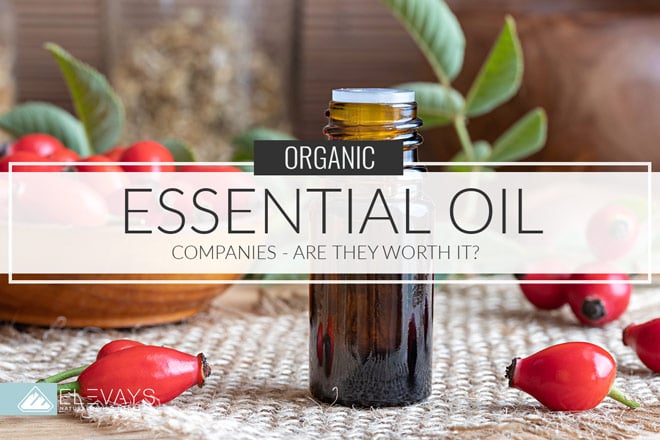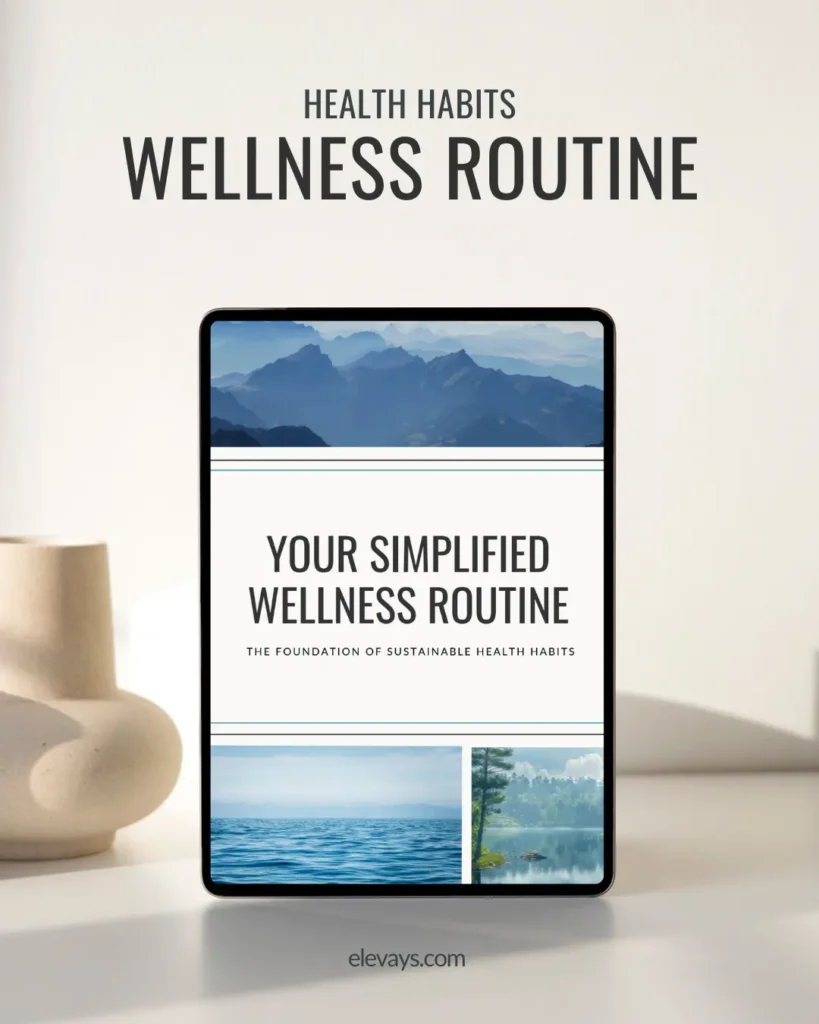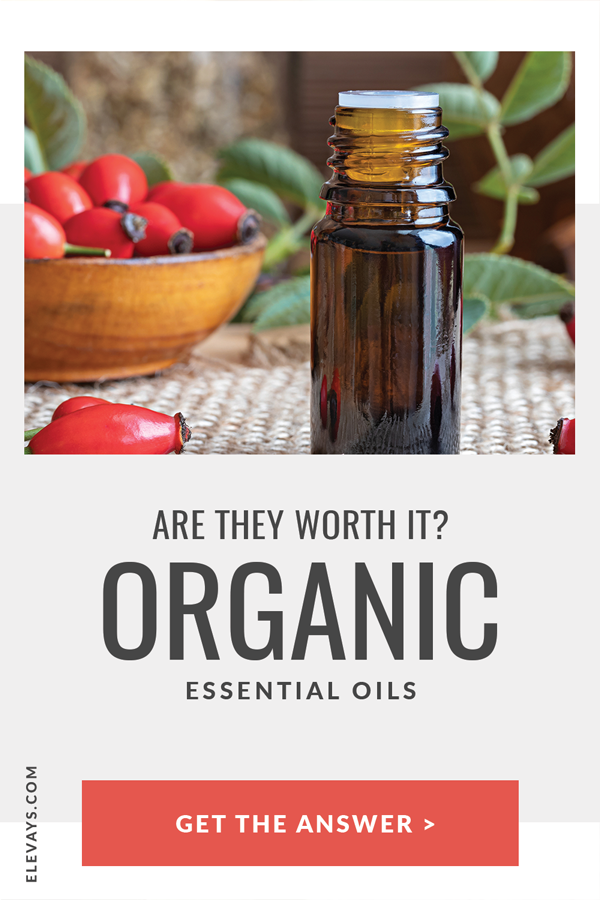The apples in your fridge are organic. The steak on the grill is organic. Your favorite moisturizer is organic. Your shampoo, conditioner, and body wash – all organic… but what about your essential oils?
On average, organic food is 47% more expensive than non-organic food! Sometimes, breaking your bank for produce without pesticides seems impractical- especially when you don’t noticeably see a difference. I’ve had tons of people ask me whether or not organic matters when it comes to essential oils.
Today we’re going to discuss what it means for essential oils to be certified organic, the difference between organic and non-organic, and if your essential oils really need to be organic.
TRUTH BOMB:
You’re
Already killing it!
If You Were More Consistent With Your Wellness Routine, You’d Be Unstoppable.
Let me just offer a spoiler early on, I don’t want to send a message that essential oils have to be organic- because they don’t- they just need to be high quality. And in this article, I’m going to explain to you why the testing of essential oils matters more than whether or not they are organic.
Organic Essential Oils Vs. Non-Organic
Organic essential oils are going to be free of pesticides. Seeing both sides of the argument for organic or non-organic, those who choose non-organic essential oils understand that though pesticides may be present, it’s typically a very small amount…if there is a GC/MS test available for that essential oil. Basically, a GC/MS test tests for purity, quality, and adulteration of an essential oil.
There’s oils that are marketed as organic essential oils and then there are oils that have the USDA seal. If we’re going to keep it real as we have been, the only essential oils that “count” as being truly organic are the ones that are certified organic essential oils by the USDA. This is the regulating body over that certification and unless the bottle has that seal, you can’t be sure that it’s really a certified organic.
Certified Organic
So what does it mean for a company to say that it has certified organic essential oils? Here’s what I found on the USDA website:
“USDA certified organic foods are grown and processed according to federal guidelines addressing, among many factors, soil quality, animal raising practices, pest and weed control, and use of additives. Organic producers rely on natural substances and physical, mechanical, or biologically based farming methods to the fullest extent possible (emphasis added).
Produce can be called organic if it’s certified to have grown on soil that had no prohibited substances applied for three years prior to harvest. Prohibited substances include most synthetic fertilizers and pesticides (emphasis added). In instances when a grower has to use a synthetic substance to achieve a specific purpose, the substance must first be approved according to criteria that examine its effects on human health and the environment.”
Essentially, organic essential oils have been harvested from plants that have not been sprayed with chemical biocides (pesticides and herbicides). It’s easy to understand the surface value of an organic essential oil. The Herbal Academy states that pesticides and “pollutants on the plants can be more concentrated in the essential oil.” Many people avoid conventional produce (we do) and shop organic whenever possible. It seems sensical to do the same with essential oils.
But there are other considerations to keep in mind. When it comes to essential oils there’s value in running scientific tests. Testing can tell more about the chemical constituents of an essential oil and detect other contaminants. Robert Tisserand, in his book Essential Oil Safety, states that gas chromatography (GC), a type of essential oil test is useful for uncovering chemical constituents of oils and identifying compounds (such as contaminants) that should not be there. The USDA doesn’t run GC testing or other essential oil analytics.
So, while there is value in certified organic essential oils, if it’s not paired with quality testing the oils may not be as “pure” as the company is claiming.
Therapeutic Grade Essential Oils
Ah, therapeutic grade – this is another term that is widely used in the essential oils market. And again, there is not a regulating body for the use of the words “therapeutic grade.” So, if you want a hard and fast definition of what that term means, well there isn’t one.
Typically companies use the term “therapeutic grade essential oils” when they want to convince you, the buyer, that the oils are pure and of high quality. Whether or not that claim can be substantiated comes down to more than just marketing phrases, though. It has to do with the companies’ practices.
Are the essential oils they produce adulterated? What kind of testing do they do to ensure purity of the oils? These are just a few things that I think about when I hear the term therapeutic grade. Additionally, according to Merriam-Webster the term therapeutic by definition means:
- Of, or relating to the treatment of disease or disorders by remedial agents or methods
- Having a beneficial effect on the body or mind
- Producing a useful or favorable result or effect
As you can see, the term therapeutic can be very broad. Here’s how I personally think of the term therapeutic in relation to essential oils:
Therapeutic Grade Essential Oils is a term used to describe the quality of essential oils that you need when you’re looking to get a specific, physiological or emotional result.
Quality and purity is important here, because these things can affect results. We’ll explore that concept more in relation to essential oil use, but hopefully that creates some clarity on the topic for now.
Food Grade Essential Oils
Typically people ask about food grade essential oils when they want to know which ones are ingestible essential oils. I’ll say that ingesting essential oils is a very controversial topic. You’ll find people that support it (a little too enthusiastically) and people that are vehemently opposed.
What Robert Tisserand has to say on the topic is actually useful. He’s been studying essential oils for many decades and has even won a life time achievement award for his work in essential oils. He’s a well-respected essential oil authority.
You can read his full interview on ingesting essential oils here but to sum it up, Tisserand believes that a high level of caution should be used when it comes to ingesting essential oils:
If you’re ingesting oils “you need to know what you’re doing. You need to know why you’re doing it; what dose you are taking, how long you are going to be taking it for, what the reason is”
He doesn’t recommend taking oils internally as a preventative approach; the human body can become “habituated” to essential oils that are overused and then they are not effective when they are needed most (for instance, taking Oregano daily as a preventative may pose issues if you need to use it in the future to fight a viral or bacterial issue)
Small doses of essential oil used internally (like one or two drops on a regular basis) he seems to be fine with; therapeutic doses in the range of 10 or more drops a day is not advised
When using essential oils internally, you should proceed with caution; don’t take oils internally “just because”; do so with purpose, using an appropriate dose and then stop to avoid sensitization or running the risk that the oils will not work later on
When it comes to the specific term food grade essential oils or oils that are safe to ingest there’s two things to keep in mind:
- The Tisserand Perspective
This is all about being cautious, having common sense and avoiding foolish decisions like taking copious amounts of Oregano (or any essential oil) internally on a regular basis “just cause” or as a preventative approach.
- What Does the Manufacturer Say?
What’s on the essential oil bottle? If we’re talking about food grade essential oils or those that are ingestible essential oils then usually the manufacturer will specify on the bottle. If there’s no specification on this on the bottle, then I’d assume the manufacturer doesn’t support ingesting their brand of essential oils and I wouldn’t do it.
There’s a huge caveat here: We’re assuming that we can trust a manufacturer if we’re buying from one of the reputable essential oil companies. If that’s not the case, then take it with a grain of salt. But this is all the more reason why there’s some research that needs to take place to truly answer the question “where can I buy essential oils?”
Conclusion
The essential oils market is unregulated; so take caution when you see words like “pure”, “therapeutic grade essential oils” or “food grade essential oils” – these phrases are for marketing purposes and don’t carry a lot of weight on their own.
There is value in certified organic essential oils but it needs to be paired with strong quality testing; otherwise the essential oil that you have may not be that great.
Hopefully, this has been helpful and created some clarity on the question of whether or not to buy organic essential oils or non-organic essential oils. And you can probably see why there really isn’t a cookie cutter answer that fits everyone. This is all about YOU and what you need and desire.
Do you prefer organic essential oils or are you content with purchasing high quality non-organic essential oils? There is no right answer, but I would love to hear. Leave a comment below!






READ the Latest
Health Habits
Health Habits
Longevity
Longevity